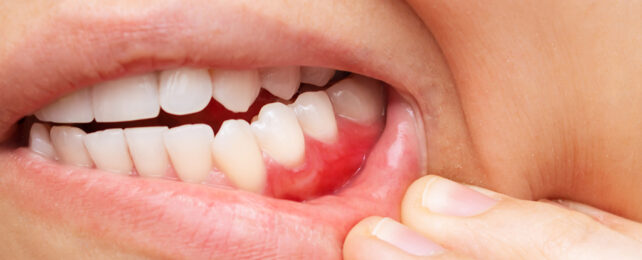There's something rather special about the Mediterranean diet: already associated with a lower risk of Alzheimer's disease, early death, poor mental health, and more besides, a new study links the diet to better gum health too.
The study, carried out by researchers from King's College London and the University of Catania in Italy, involved 195 participants with an average age of 49, who were given a health check-up and quizzed on their dietary habits.
Those participants who stuck more closely to the plant-rich Mediterranean diet were less likely to have gum disease, the data showed – especially those who didn't eat much red meat.
Related: This Diet Helps Lower Dementia Risk, And We May Finally Know Why
What's more, the healthier diet was also associated with fewer inflammatory markers in the blood – biological indicators that the body is under stress or being damaged. It's another health win for eating in the Mediterranean style.
"Our findings suggest that a balanced, Mediterranean-type diet could potentially reduce gum disease and systemic inflammation," says periodontist Giuseppe Mainas, from King's College London.

The Mediterranean diet gets its name from the part of the world where it's habitually eaten, and it favors fruits, vegetables, whole grains, and fish. Processed foods, too much dairy, and red meat are limited.
It's important to bear in mind that this study didn't track the participants over time, so it's just a snapshot of a link, without any proof of cause and effect. That said, the association is strong enough to warrant looking into further.
The researchers suggest that compounds found in plant-based foods are likely to be working in the body to reduce inflammation, and that red meat works in the opposite direction. While severe gum disease (or periodontitis) is largely driven by plaque build-up, the body's immune response is thought to be a significant factor too.
"We observed that there may be a connection between periodontal disease severity, diet, and inflammation," says Mainas. "These aspects should be holistically considered when assessing the treatment for periodontitis in patients."
"Our research offers an important starting point that can lead to more research to better understand the relationship between food intake and gum disease."
The researchers aren't suggesting that you can just change your diet around and forget about brushing your teeth to ward off gum disease – but the foods we're eating, and the bacteria they encourage, could be more important than previously thought.
Add in all the other benefits of eating the Mediterranean way, particularly when it comes to protecting brain function, and there's a long list of reasons to get these kinds of foods onto your plate more often than not.
Dieting changes aren't always easy of course, but they can be a relatively affordable, accessible, and effective way of improving oral health – something that we know is a problem for billions worldwide.
"Our research shows the potential effect that a nutrient-dense, plant-rich diet could play in improving the nation's gum health," says periodontist Luigi Nibali, from King's College London.
"Nevertheless, more investigation is needed to develop personalized approaches to help people manage their gum health."
The research was published in the Journal of Periodontology.
